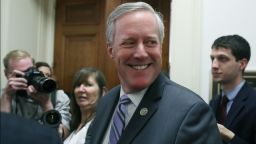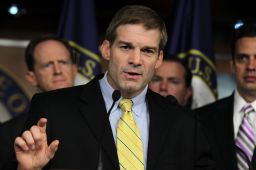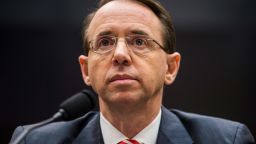The House Republican duo targeting senior leaders at the Justice Department have a new demand for Deputy Attorney General Rod Rosenstein: They want to see an unredacted copy of the memo he sent to whom detailing the scope of special counsel Robert Mueller’s investigation.
The same lawmakers are also demanding a new disclosure from Attorney General Jeff Sessions: They want to know whether he was involved in the decision to raid the personal attorney of President Donald Trump, Michael Cohen, according to a letter sent last week.
The two new requests are the latest in a series of asks from Republican Reps. Mark Meadows of North Carolina and Jim Jordan of Ohio, the conservative Freedom Caucus lawmakers who say the Justice Department is stonewalling Congress and have suggested the department leaders could be on the “path to impeachment” if they won’t cooperate.
In a private meeting last month, Jordan and Meadows laid out their concerns to Rosenstein about what they believe has been a lackluster response by the Justice Department to the GOP’s request for documents. And one document request appeared to catch Rosenstein by surprise: the demand for the August memo laying out the scope of the Mueller probe, a document that was heavily redacted in recently unveiled court filings.


Rosenstein resisted the request by the GOP lawmakers to review an unredacted, or less redacted, version of the memo, according to Jordan. But they have no intention of relenting, he said.
“It seems to me the American people, who elected Donald Trump president, have a right to know the full scope and framework of the special counsel investigation of the President they elected,” Jordan said.
At an event in Washington, Rosenstein said Tuesday he would not buckle to what he characterized as threats against him or unreasonable demands from Congress.
“There have been people who have been making threats privately and publicly against me for quite some time and I think they should understand by now the Department of Justice is not going to be extorted,” he said.
In response, Meadows tweeted on Tuesday afternoon, “If he believes being asked to do his job is ‘extortion,’ then Rod Rosenstein should step aside and allow us to find a new Deputy Attorney General — preferably one who is interested in transparency.”
Meadows and Jordan, along with a handful of their allies in Congress, have been the driving forces behind the push within the House Judiciary and Oversight committees to investigate what they believe is FBI misconduct with the the Hillary Clinton email investigations and the handling of the Russia probe.
They’ve privately pushed for – and succeeded at getting – their committee leadership to take a harder line with the Justice Department, something that has ended in scores of new documents turned over to Capitol Hill as they seek to find improprieties with how the major investigations have been conducted.
The two men have been helped by Trump’s disdain for the Justice Department – and the President’s close alliance with the House Freedom Caucus, especially the conservative effort to target the FBI, Sessions, Rosenstein and Mueller.
Democrats argue that the effort from Meadows and Jordan – especially when backed by Judiciary Chairman Bob Goodlatte of Virginia, Oversight Chairman Trey Gowdy of South Carolina and Intelligence Chairman Devin Nunes of California – is really an attempt to provide Trump with ammunition to fire either Sessions or Rosenstein in order to curtail the Mueller investigation.

Rosenstein is a key figure at the Justice Department – and also a target – because he supervises the special counsel probe, giving him the power to dismiss Mueller, with Sessions recused. Many Democrats have said that Trump’s firing of Rosenstein would equate to firing Mueller.
While Republicans insist their motivation is the desire to provide aggressive oversight, Meadows and Jordan have been vocal about their concerns over the Mueller probe and desire for fresh leadership at the Justice Department.
Earlier this year, the two men called on Sessions to resign, a move that would lead to a new attorney general who presumably would not be recused from overseeing the Russia investigation – and would be met with fierce pushback among most Republicans on Capitol Hill.
And this week, The Washington Post reported that Meadows and the House Freedom Caucus had drafted articles of impeachment against Rosenstein as a “last resort.”
Rosenstein faces off with GOP
House Republicans have also initiated a series of standoffs with Rosenstein over documents related to the FBI’s investigations into both Clinton and Trump.
Rosenstein has faced subpoenas and a barrage of criticism from three committees, and he’s mostly acquiesced to their demands for specific documents after facing pressure from House Republicans who have had the backing of House Speaker Paul Ryan, a Wisconsin Republican.
After battling the House Intelligence Committee for months, the Justice Department agreed to give the panel access to the Foreign Intelligence Surveillance Act warrant application on then-Trump adviser Carter Page.
And amid a threat from Nunes to begin impeachment proceedings against Rosenstein and FBI Director Chris Wray, Rosenstein agreed last month to allow the intelligence panel to view the two-page electronic communication document that launched the counterintelligence investigation into Trump and Russia.
Rosenstein has also clashed with the Judiciary and Oversight panels, which include Meadows and Jordan.
They’ve slammed the Justice Department for its slow document production in their investigation into the FBI’s handling of the Clinton probe, which led to a subpoena from Goodlatte and the appointment of a DOJ prosecutor to focus on document production.
Goodlatte and Gowdy struck a deal with Justice Department officials on that front last month that satisfied the Republican chairmen. In a rare move, Justice officials agreed to allow a dozen Republican and Democratic staff from the House Judiciary and Oversight committees into rooms at the department to review hundreds of thousands of documents concerning the FBI’s handling of the Clinton investigation, according to multiple sources familiar with the agreement. They have computers set up on the third floor of the department, and the committee staff cycle in and out every day, bound by an agreement not to disclose classified information.
There have been other demands, too. Goodlatte, Gowdy and Nunes sent a letter demanding copies of the memos that former FBI Director James Comey, and less than a week later Goodlatte was preparing a subpoena for the documents.
But Rosenstein defused the potential for a conflict there as well, by agreeing to give the committees unclassified, redacted versions of Comey’s seven memos. Minutes after they had been sent to Capitol Hill – in an easily transmittable electronic document – they were leaked to reporters and made public. The committees also got access to unredacted, classified versions of the Comey memos.
On Tuesday, Goodlatte and Gowdy sent a letter to Sessions and Rosenstein asking them to disclose more details about law professor Daniel Richman’s handling of the Comey memos, after the former FBI director shared them with Richman last year. Goodlatte is also pressing for information about whether the Justice Department under the Obama administration slow-walked the FBI’s investigation into the Clinton Foundation.
Sessions back under the spotlight
The new push to learn about Sessions’ involvement in the Cohen raid could put the attorney general in Trump’s crosshairs once again. If Sessions were to say he green-lit the probe, it could once again draw the anger of the President. Yet if Sessions were not involved, Trump could question why his attorney general didn’t stop what the President said was “an attack on our country.”
Moreover, if Sessions doesn’t respond to the conservatives, they are bound to make that known to Trump, who talks regularly with Meadows.
Meadows told CNN that the two men are “trying to get a better understanding of how he’s supervising the non-Russia part” of the investigation.
Meadows, Jordan and three of their House Republican colleagues sent a letter to Sessions last week asking him to explain whether he “approved, were consulted or had any involvement in this decision by the Department of Justice.” The lawmakers argued Sessions “should have been involved,” according to the letter, which was also signed by Reps. Lee Zeldin of New York, Ron DeSantis of Florida and Matt Gaetz of Florida.
“I would think the highest law enforcement officer in the land should have a say in a decision by the Justice Department to (go) kicking in the door of not just any lawyer – but the lawyer for the President,” Jordan said.
There were reports last month that Sessions did not recuse himself in the Cohen matter, but he has dodged many questions from lawmakers publicly about his role – and whether he’s fully recused.
“I will not be able to describe on any matters, the parameters of matters that might be under investigation, the subjects of any investigation, because it’s an ongoing investigation, and I’m not at liberty to discuss it,” Sessions said at a congressional hearing last week. “And it’s the policy of the department that on delineating or talking about recusals, in fact, does reveal that and you shouldn’t talk about it publicly.”
But Democrats on Capitol Hill say it’s time for Sessions to step aside from that inquiry, given his ties to the President.
“If there’s any evidence that what is being investigated with Michael Cohen touches on the 2016 election, potential Russian interference, he should (recuse himself),” said Sen. Chris Coons of Delaware, a member of the Senate Judiciary Committee. “Given what I’ve seen reported about that ongoing investigation, I think it’s likely that the attorney general should recuse himself in that case.”
Asked if Sessions should recuse himself from the Cohen matter, Sen. Lindsey Graham, a Republican from South Carolina, said: “If it’s about Russia, yes. If it’s not, no.”
Yet, Senate Judiciary Chairman Chuck Grassley, an Iowa Republican and Sessions ally, said he’d leave the matter up to the attorney general.
“Consequently, I would rely on them to make a judgment on whatever else he should recuse himself in,” Grassley said.



